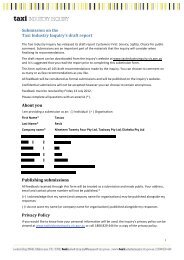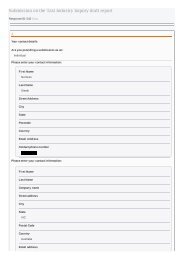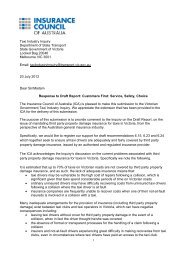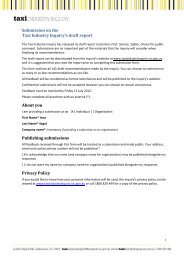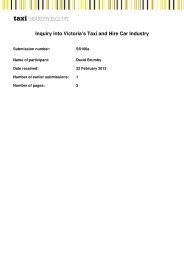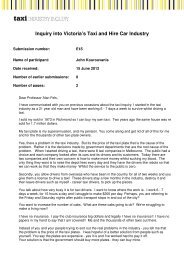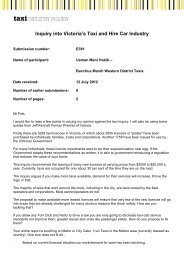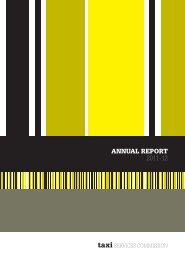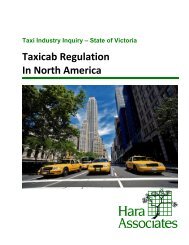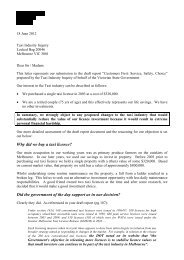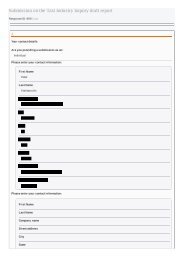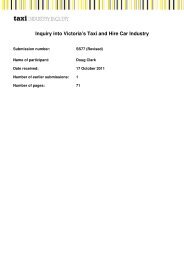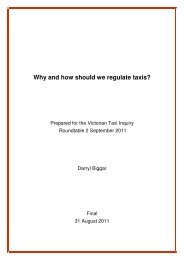Part D â Understanding and improving industry performance (PDF ...
Part D â Understanding and improving industry performance (PDF ...
Part D â Understanding and improving industry performance (PDF ...
You also want an ePaper? Increase the reach of your titles
YUMPU automatically turns print PDFs into web optimized ePapers that Google loves.
Case study<br />
Cabcharge penalised for misuse of market power<br />
ACCC v Cabcharge Australia Ltd [2010] FCA 1261<br />
In September 2010, the Federal Court imposed a fine of $14 million – the highest ever penalty for misuse of<br />
market power – on Cabcharge for contravening section 46 of the Trade Practices Act 1974 (TPA).<br />
The court declared that Cabcharge had taken advantage of its substantial degree of power in the domestic market<br />
for the supply of:<br />
• services to enable the manual <strong>and</strong> electronic acceptance, by non-cash means, of payments for taxi fares <strong>and</strong><br />
charges by taxi passengers; <strong>and</strong><br />
• non-cash instruments that could be used only for the payment of taxi fares <strong>and</strong> charges,<br />
by<br />
• refusing to deal with competing suppliers to allow Cabcharge payments to be processed through rival EFTPOS<br />
terminals; <strong>and</strong><br />
• supplying taxi meters <strong>and</strong> fare schedule updates below cost or free of charge.<br />
Cabcharge admitted to three contraventions of section 46(1) as part of its settlement with the ACCC. Cabcharge<br />
had refused requests by Travel Tab Australia Pty Ltd (a competing payment processing system) to allow Cabcharge’s<br />
non-cash payment instruments to be accepted <strong>and</strong> processed electronically on the Travel Tab system. Cabcharge<br />
acknowledged that, although there would have been time <strong>and</strong> costs involved in developing appropriate interfaces,<br />
there was no technical reason that would prevent any electronic taxi-specific payment product from being processed<br />
by any EFTPOS terminal as long as the instrument <strong>and</strong> terminals complied with banking <strong>industry</strong> protocols.<br />
With Cabcharge holding such substantial presence in the market, the court found that this conduct deterred or<br />
prevented Travel Tab from engaging in competitive conduct in the processing market.<br />
Vertical integration<br />
The high degree of vertical integration involving the<br />
payment systems market <strong>and</strong> other layers of the taxi<br />
<strong>industry</strong> has also raised barriers to entry <strong>and</strong> barriers to<br />
expansion for potential entrants seeking to process noncash<br />
payments in the taxi <strong>industry</strong>.<br />
Numerous vertical mergers involving Cabcharge have<br />
been cause for concern for the ACCC over the past<br />
15 years. Cabcharge’s acquisition of network service<br />
providers (NSPs) in Australian capital cities is considered<br />
to have given Cabcharge valuable influence over the<br />
payment systems installed in its affiliated taxis <strong>and</strong><br />
raised barriers to entry that have protected its position<br />
in the payments system market. This influence was<br />
demonstrated by the authorisations requested (<strong>and</strong><br />
granted by the Trade Practices Commission) by several<br />
networks between 1986 <strong>and</strong> 1994 to require taxi<br />
operators <strong>and</strong> drivers to accept certain forms of noncash<br />
payments approved under the Cabcharge Account<br />
System (see case study).<br />
Through its NSPs, Cabcharge also provides a wide<br />
range of services to the <strong>industry</strong>, including driver training,<br />
taxi vehicle ‘fit-outs’, taxi cameras <strong>and</strong> meters, licence<br />
brokerage <strong>and</strong> insurance for taxi operators. It is the<br />
inquiry’s view that these activities have implications for<br />
competition in the payments services markets. More<br />
specifically, they help to maintain market power in<br />
payment instruments <strong>and</strong> payments processing: that<br />
is, Cabcharge is not likely to be seeking to ‘foreclose’<br />
downstream markets by providing affiliated NSPs with<br />
lower cost access to payments services, but is seeking<br />
to make it more difficult for entrants into payments<br />
processing to provide services to taxi operators.<br />
Through this strategy, elements of the market essentially<br />
become foreclosed to other processors, making it harder<br />
for them to build scale <strong>and</strong> compete with Cabcharge.<br />
This protection of the 10 per cent surcharge is a key<br />
consideration for Cabcharge given that income from the<br />
service fee contributes around $87.3 million to its annual<br />
revenue (almost 50 per cent of the company’s total<br />
annual revenue). 19<br />
19 Cabcharge Annual Report 2011, accessed on 29 March<br />
2012 at: www.cabcharge.com.au/pdfsubframe.htm?/<br />
pdf/2011CabchargeAnnualReport.pdf?sel=conditions, p.42<br />
<strong>Underst<strong>and</strong>ing</strong> <strong>industry</strong> <strong>performance</strong> CUSTOMERS FIRST 257



